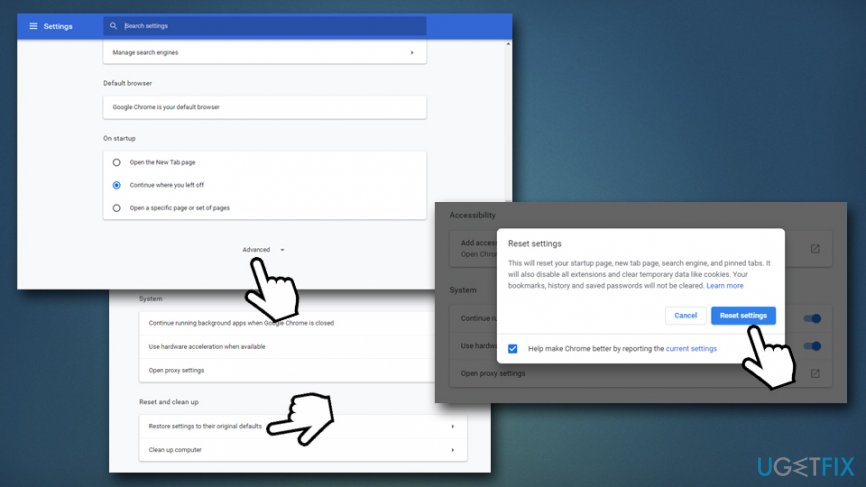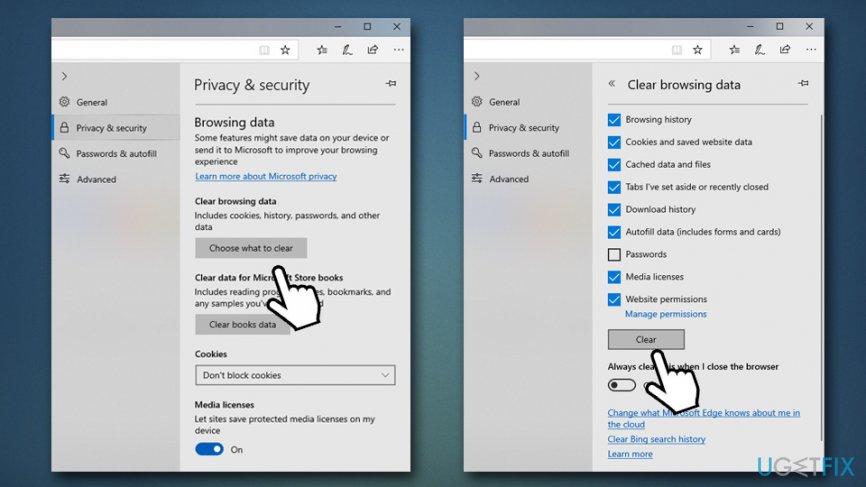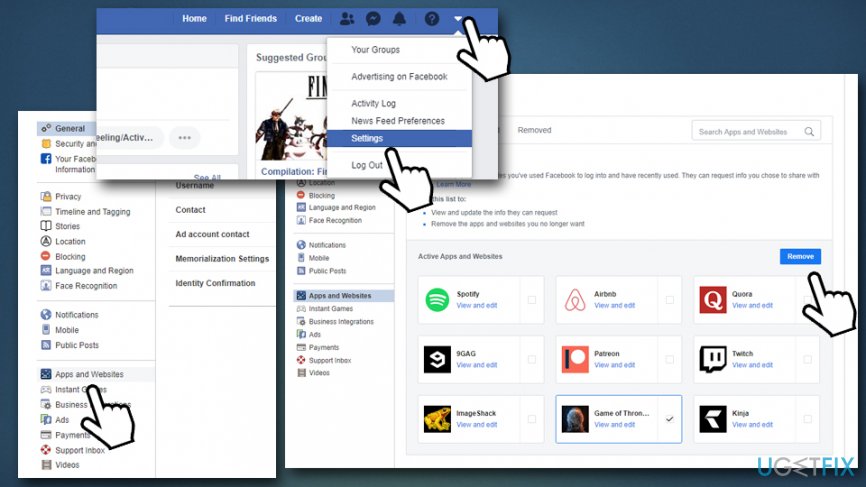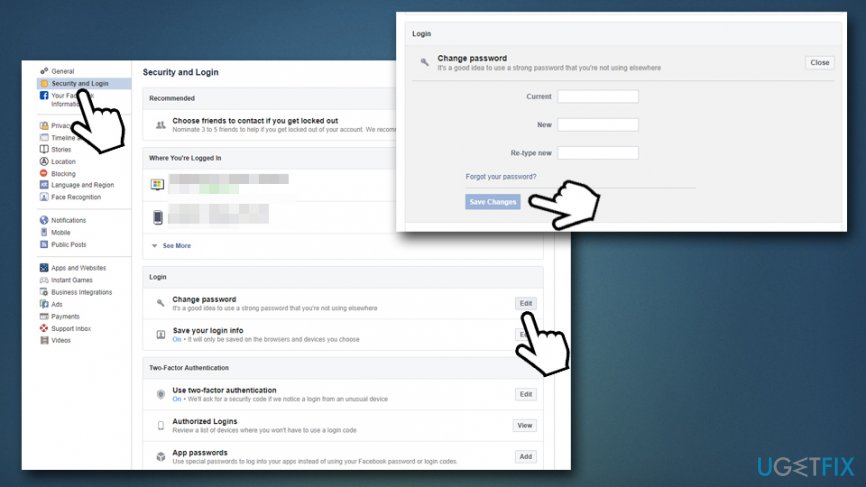Question
Issue: How to fix Facebook account if it sends malicious links?
So I have this problem. My friends keep on telling me that they receive suspicious links from my account on Facebook. However, when I look through these conversations, I can find absolutely nothing. How can I not be seeing these notifications if they were sent from my account? Can I stop this secret spamming?
Solved Answer
Facebook sending malicious links is a common problem among other issues that users who are or have been infected with a Facebook virus face. The persistent messages that your friends receive from you (but are not) or unknown sources are constantly being developed and perfected by cybercriminals – they are used for various purposes, including malvertising,[1] phishing, etc.
Nevertheless, in some cases, Facebook spam is used to distribute devastating malware, such as Locky ransomware or Koobface worm. Be aware that any type of malware can be delivered via Messenger links that also include an eye-catching phrase like “OMG! I can't believe this!” or “Look at this video.” Thus, if Facebook is sending malicious links from your account, there is a high chance you are infected with malware or somebody is using your account.
These viruses usually work through browser extensions or add-ons that are installed on the computer, but they can also be web-based. Malware like this can be challenging to spot. That is why it is advisable to keep your computer under the constant control and scan it with reputable antivirus software regularly. If you struggle with crashes and errors on your system, you can also employ FortectMac Washing Machine X9 to fix malware damage.
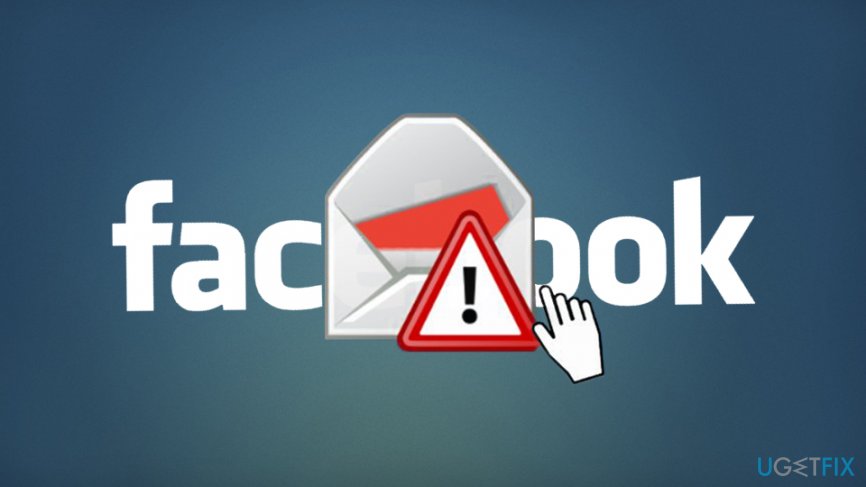
Another popular Facebook spam campaign aims to collect the login credentials of the social network account and then use them to manipulate likes to promote particular Facebook pages or take over the account entirely. In case of the latter, users are unable to login to Facebook completely. This might be another reason why your Facebook is sending malicious links to your friends.
Facebook sending malicious links can be a real problem to everybody, as it can result in all people in the friend list to be infected as well. Below you will find numerous solutions and ways how to fix Facebook sending malicious links issue – follow each step carefully.
Solution 1. Scan your computer with anti-malware software
As we previously mentioned, malware can cause Facebook to send malicious links to your friends. The root cause of infection might be virtually anything – from downloading pirated software,[2] opening malicious spam email attachments, or failing to update the operating system with the latest security patches. Nevertheless, computer compromise can affect social network accounts as well, especially if malware responsible for data theft is a keylogger.[3]
Therefore, if Facebook is sending malicious links from your account, your first move should be a full system scan with anti-malware software. There are several free scanners available on the market – you can choose the one that appeals to you the most. Nevertheless, you should remember that free anti-malware programs do not have the advanced functionality of paid versions – so you might want to purchase a full license for full protection.
Solution 2. Remove all extensions or reset your browsers
In some cases, malicious scripts[4] can be loaded via a malicious browser extension that might result in Facebook sending malicious links. To prevent that, you should remove all the unknown extensions from your browsers or reset them instead. Here's how to do it on most popular browsers:
Google Chrome
- Go to Menu > Settings
- Click on Advanced
- In Reset and clean up section, click Restore settings to their original defaults
- Confirm with Reset settings

Mozilla Firefox
- Go to Menu > Help
- Select Troubleshooting Information
- Click Refresh Firefox…
- Press Refresh Firefox once again to confirm
MS Edge
- Go to Menu > Privacy & security
- Under Clear browsing data, choose Choose what to clear
- Select the relative boxes and click Clear

Internet Explorer
- Click Gear icon
- Select Internet Options > Advanced
- Pick Reset at the bottom
- Tick the Delete personal settings box and click Reset
Solution 3. Remove apps from Facebook
You can add apps or games via Facebook – you will see posts from these apps. You should remove all the suspicious apps that might have been added by malware or malicious actors who gained unauthorized access to your account. Here's how to do it:
- Log in to Facebook and go to your News Feed
- Click the facing-down arrow at the top-right of your screen and select Settings
- Pick Apps and Websites from the left menu
- Select apps you want to get rid of and then click Remove button

Solution 4. Change your Facebook password
It is possible that Facebook sending malicious links is related to manual operations if your account was hijacked. To make sure that nobody else is using your account, you should reset your password. Note: only do this after you ensure that your machine is not infected with malware – if the attacker has a way to harvest keyboard input data, he/she can see your new passwords.
- Go to your News Feed on Facebook
- Click the facing-down arrow at the top-right of your screen and select Settings
- Pick Security and Login on the left side
- Under Login section > Change password select Edit
- Enter relevant information and click Save Changes

Solution 5. Ask Facebook for help
If the above-mentioned solutions did not stop Facebook sending malicious links, you could also refer to the following “Help with a hacked account” page. Pick the answer that is relevant to you and proceed with the guidelines provided on the page.
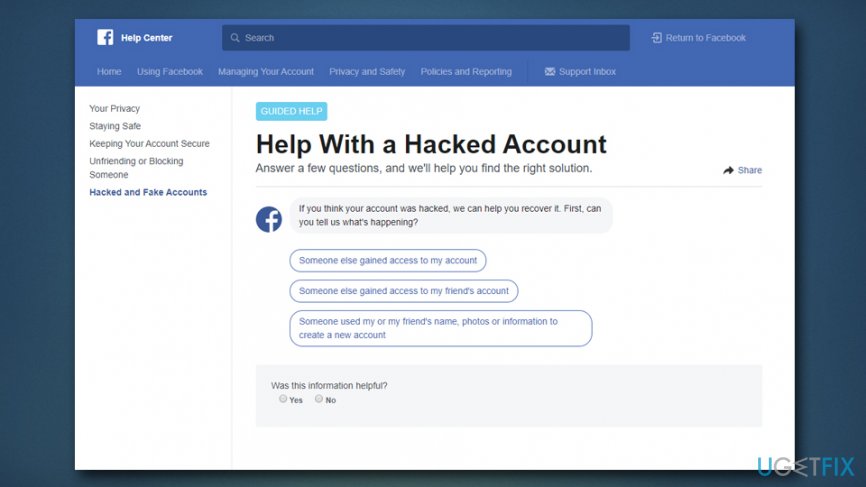
Repair your Errors automatically
ugetfix.com team is trying to do its best to help users find the best solutions for eliminating their errors. If you don't want to struggle with manual repair techniques, please use the automatic software. All recommended products have been tested and approved by our professionals. Tools that you can use to fix your error are listed bellow:
Prevent websites, ISP, and other parties from tracking you
To stay completely anonymous and prevent the ISP and the government from spying on you, you should employ Private Internet Access VPN. It will allow you to connect to the internet while being completely anonymous by encrypting all information, prevent trackers, ads, as well as malicious content. Most importantly, you will stop the illegal surveillance activities that NSA and other governmental institutions are performing behind your back.
Recover your lost files quickly
Unforeseen circumstances can happen at any time while using the computer: it can turn off due to a power cut, a Blue Screen of Death (BSoD) can occur, or random Windows updates can the machine when you went away for a few minutes. As a result, your schoolwork, important documents, and other data might be lost. To recover lost files, you can use Data Recovery Pro – it searches through copies of files that are still available on your hard drive and retrieves them quickly.
- ^ Malvertising. Imperva. Learning Center.
- ^ Mary Jo Schrade. Hidden risks in pirated software. Microsoft. Asia News Center.
- ^ Margaret Rouse. Keylogger (keystroke logger or system monitor). SearchSecurity. Information Security information, news and tips.
- ^ Josep Albors. Malicious scripts in compromised websites and how to protect yourself. ESET. We live security blog.
